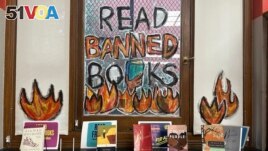19 March 2024
A nonprofit group has identified more than 1,500 books that local schools in America have banned from their libraries and classrooms in 2022-2023.
The free-speech activism group PEN America is based in New York City. The group said the number represented a 33 percent increase from the year before. The American Library Association (ALA) says that there were more attempts to ban books from schools last year than ever before.
Moms for Liberty is a parental rights group based in Florida. The group has supported efforts to bar certain books from school libraries around the country. Group co-founder Tiffany Justice told the television network NewsNation last year that many books in school libraries are not right for children or teenagers and are harmful.

FILE - A Banned Books Week display is at the Mott Haven branch of the New York Public Library in the Bronx borough of New York City on Saturday, October 7, 2023. (AP Photo/Ted Shaffrey)
"Public school children — K through 12 — do not have unfettered access to the internet at school, or movies, or music," Justice said. "But somehow these books with these horribly explicit, graphic content are finding their way onto bookshelves in public schools all over America."
Gay Ivey is a professor of literacy at University of North Carolina- Greensboro. She and her research partner Peter Johnston from the University of Albany have studied students' motivations to read. They also have studied how students react to reading young adult literature. Ivey said school boards and policymakers do not agree about the purpose of reading in school.
Ivey and Johnston said they found that reading books considered "disturbing" by students was beneficial for their learning and emotional development. The two said parents also noticed a growth in their children after they read the disturbing books.
In one of Ivey and Johnston's studies, they spent a year in a middle school in an eastern town. They asked eighth grade students in an English class to choose any book they wanted to read.
The teens read the books during class time. They were not under any pressure from teachers to finish the book or to produce any schoolwork about the book. The researchers later spoke to 71 of the students about their experiences reading the books they chose. They also spoke to their parents and teachers.
Many of the students chose to read books that deal with difficult subjects like depression, suicide, illegal drug use, or sexual exploitation. Some of the books students chose were ones that schools around the country have banned. These books included Thirteen Reasons Why by Jay Asher, Identical by Ellen Hopkins and Sold by Patricia McCormick.
Ivey told VOA that students are drawn to books that deal with troubling subjects. Instead of being harmed by such subjects, reading about fictional characters made them more empathetic, she said. Ivey said they also were more thoughtful about the characters' motivations and actions. The researchers found that reading made the students happier, and helped some heal from sadness or depression. The difficult nature of the books made the students more likely to discuss the subjects with teachers, parents and friends.
The students in the study read books "that kind of throw you off-kilter that make you want to talk to somebody else," Ivey said. "The social interaction around it was really important, including talking to parents and teachers."
The subjects covered in the books may make both kids and adults uncomfortable. But Ivey said she and Johnston "came to realize that what really matters is the meaning that the kids make out of the books, not adults' meanings that they make. Which are often times really off-base."
Ivey said reading texts with difficult and troubling subject matter makes students more involved readers and learners. Students are able to relate to characters facing difficult decisions and think about how they would react to a situation described in the book.
Ivey and Johnston interviewed one teacher who said books that dealt with drugs, sex, and other issues made it easier to discuss those subjects in class. Discussions about books, "made it a safe way to kind of get into these things," the teacher said.
Reading disturbing books also made students more likely to learn as a group, the researchers said.
With the troubling texts, sometimes it is "really necessary to grab everybody around you and put all heads around it and teach each other," Ivey said. "More and different kinds of learning happens in those situations."
I'm Dan Novak.
Dan Novak wrote this story for VOA Learning English.
_________________________________________________
Words in This Story
unfettered — adj. completely uncontrolled and unrestricted
explicit — adj. without hiding anything; clearly describing things
motivation — n. the reasons for doing something
disturbing –adj. causing worry, trouble or mental tension
beneficial — adj. something that has a good effect
exploitation — n. to use something often for selfish or greedy purposes
draw to –v. (phrasal) to become interested in or attracted to
character –n. a person in a book, play or movie who is not real
fictional –adj. not real but a product of the imagination
empathy — n. believing that you share someone else's experiences and emotions
off-kilter — adj. not balanced or even
off-base — adj. not firmly footed, not square or weakly founded